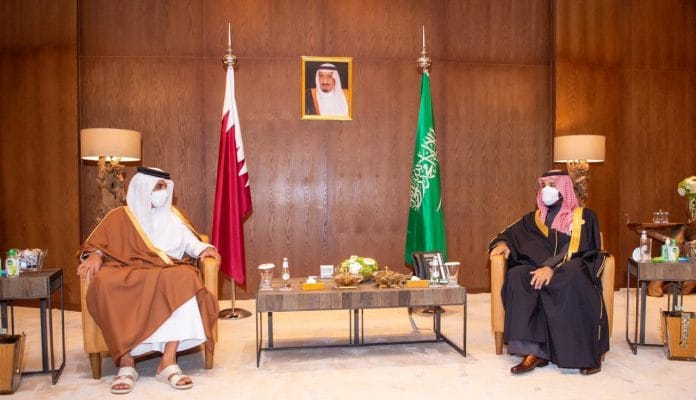On Tuesday, Qatar was welcomed back into the fold of Gulf Arab states after a three-and-a-half-year embargo. As my colleague Hussein Ibish noted, this does not mean the country has resolved its disputes with Saudi Arabia, the United Arab Emirates, Bahrain and Egypt — the neighbors that imposed its isolation. No lambs were fattened for the returning prodigal, no laudations composed in welcome. Still, there is no gainsaying the fact that Doha has emerged stronger for the experience.
Among the quartet, there was a sense of resignation that the embargo failed in its objective, which was to bring Doha to heel, or at least in line with the Saudi-Emirati consensus on issues ranging from political Islam to the threat posed by Iran. Those issues underpinned the 13 demands they issued to Qatar in the summer of 2017. For good measure, the Qataris were also asked to close down Al Jazeera, the TV network that frequently criticizes the governments of neighboring countries.
The Emiratis, who were the prime movers behind the embargo, now claim the list of demands was no more than a “maximalist negotiating position.” But the concessions they were able to extract from the Qataris were minimalist. Judging from the official pronouncements, Doha has simply decided not to gloat over its neighbors’ failure.
The UAE’s de facto leader, Crown Prince Mohammed bin Zayed of Abu Dhabi, credited for last fall’s normalization of relations with Israel, has maintained silence on the subject of reconciliation with Qatar.
Meanwhile, Saudi Crown Prince Mohammed bin Salman has made the best of the situation. He used the 41st summit of the Gulf Cooperation Council for a series of photo ops of the two youngest rulers in the Arabian Peninsula — him and Qatar’s emir, Sheikh Tamim bin Hamad Al Thani.
It gave MBS, as the Saudi prince is known, the simulacrum of a diplomatic success on a global stage, a welcome break from a long series of foreign-policy blunders that include the damaging intervention in the Yemeni civil war, the disastrous fallout of the murder of journalist Jamal Khashoggi and, of course, the embargo itself.
And it allowed MBS to reassert Saudi primacy in Arab affairs. In recent years, it has often been the Emiratis running regional matters. They pursued an aggressive strategy of economic and diplomatic outreach that culminated with ending the Gulf Arab boycott of Israel. For the most part, MBS has been guided by MBZ, as Abu Dhabi’s crown prince is known. But when the Saudi leader decided to end Qatar’s isolation, the Emiratis had no choice by to follow suit.
But it is the ruler of Qatar who comes away from all this with the greatest gains. In essence, the embargo ended on the emir’s terms, with Doha retaining as much control of its policies, at home and abroad, as it had before the isolation began. Sheikh Tamim can claim, with some justification, that his tiny nation has become stronger over the last few years.
On the foreign-policy front, Qatar was able to deepen its relations with Turkey and Iran during the embargo — as both countries provided vital supplies and transport links — without weakening its ties to the U.S. or the major world powers. Doha used its vast wealth to build up its armed forces, acquiring an array of weapons systems from the U.S. and Europe.
Qatar also developed its own food security by encouraging local companies in agri-businesses. Some of these companies will now have the opportunity to compete in the GCC and Egyptian markets against Saudi and Emirati firms.
The question now is whether Sheikh Tamim can parlay these gains into a bigger role for Doha in regional affairs — the ambition that raised hackles among his Arab peers in the first place. Having built on Qatar’s relations with Iran, he might be able to present himself to the incoming Joe Biden administration as the best intermediary for diplomacy with Tehran. (The Arab elder statesmen who traditionally played that role, Sultan Qaboos bin Said of Oman and Kuwait’s Sheikh Sabah Al-Ahmad Al-Jaber Al-Sabah, both passed away last year.) He might even be able to play that role in a Turkish-American reconciliation.
If Qatar’s neighbors harbored any hope that it would join them in an anti-Iran or anti-Turkey alliance, they have another think coming. Having called the tune for its readmission, Doha will not be joining their Arab chorus. –Bloomberg
Also read: UAE says Qatar media ‘determined to undermine’ efforts to end standoff






